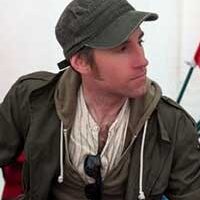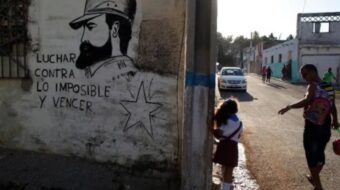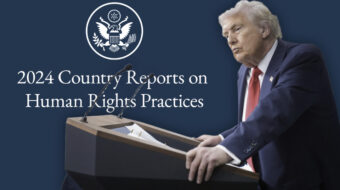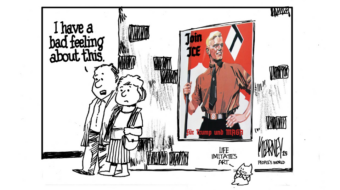
The Speaker of the Canadian House of Commons, Anthony Rota, has been forced to resign after his astonishing praise for 98-year-old Yaroslav Hunka in the Canadian Parliament last week. Hundreds of Canadian MPs gave not one but two standing ovations to Hunka, a Ukrainian-Canadian veteran of the Nazi Waffen-SS Galicia Division during the Second World War (euphemistically described by the Associated Press and others as the “First Ukrainian Division”).
Hundreds of Canadian MPs, including Prime Minister Justin Trudeau and Deputy Prime Minister Chrystia Freeland, gleefully smiling and applauding was a chilling spectacle.
MPs such as Karina Gould, a senior member of the governing Liberal Party, making subsequent appeals for MPs to “avoid politicizing this incident” since the backlash, has been an altogether different spectacle, but a no less sorry one.
The images from the chamber will remain a shameful and egregiously offensive snub to the few remaining Canadian veterans of D-Day and other campaigns against the Nazis, to the families of the 45,000 Canadian soldiers who died during the war, and to Canada’s hundreds of thousands of Jews. Whether Rota’s resignation, Trudeau’s subsequent apology, and Gould’s lamentable appeal will be enough to get them off remains to be seen.
(It’s worth noting that so far Ukrainian President Volodymyr Zelensky, also present and applauding, has said nothing of the incident.)
So, what is going on here?
Since virtually VE Day itself, Western intelligence agencies and governments covertly supported and provided shelter to Nazi, fascist, and ultra-nationalist groups as part of the Cold War against the Soviet Union.
Many were rehabilitated into judicial, governmental, and bureaucratic roles in West Germany, for instance, or helped develop U.S. weapons systems. Some even took up senior positions in NATO itself.
The Organization of Ukrainian Nationalists (OUN) and its armed wing, the Ukrainian Insurgent Army (UPA), were a faction of ultra-right nationalists and former Nazi collaborators led by the notorious Stepan Bandera, who sought out refuge in the U.S. and Canada.
The OUN has long promoted the fascistic idea of “many holocausts not one,” offering justifications for the “anti-communist” pogroms that saw tens of thousands of Ukrainian Jews and Poles butchered during the war, thus diluting the actual Holocaust while casting Hunka’s Ukrainian SS comrades, who swore a personal oath of allegiance to Adolf Hitler, as “victims of communism.”
Canada is home to the largest Ukrainian diaspora outside Russia. In 1985, a Canadian parliamentary royal commission—the Deschenes Commission—was established to investigate claims that Canada had become a haven for Nazi war criminals. The commission found that at least 600 former members of the Waffen-SS Galicia Division— branded a criminal organization at the Nuremberg trials—were living in Canada.
Canada of course is a member of the Commonwealth, the vestigial remnant of the British Empire, and still appoints a British governor general. What did the British government know about the emigration to Canada of alleged Nazi war criminals, and did the same thing happen in the U.K.?
MI6—British intelligence—had been working closely with the former Nazi collaborators in Ukraine, including the Banderite UPA, for many years following the war. Bandera himself continued to operate from West Germany and visited Ukrainian nationalist forces in several countries. The Soviet Union demanded his extradition, but the U.S. blocked it. In Munich, in 1959, he was killed by Soviet intelligence forces.
MI6 handlers were instrumental in siphoning what remnants of the UPA were left into safe havens, including Canada.
In Canada, so-called “anti-Soviet” collaborators are often branded nationalist war heroes, just like Hunka. Various monuments and commemorations to these people exist—a monument to Roman Shukhevych, an officer of the Waffen-SS auxiliary police in Ukraine and a perpetrator of the Galicia-Volhynia massacres during the war, stands outside the Ukrainian Youth Unity Complex in Edmonton, Alberta.
Deputy Prime Minister Freeland’s own grandfather, Michael Chomiak, received a Nazi-seized apartment from its previously Jewish owners, and became editor of the newspaper Krakivs’ki Vista that produced, in the words of historian John-Paul Himka, “vehemently anti-Semitic” Nazi propaganda.
Freeland is not her grandfather, but the point is that the rehabilitation of men like Chomiak, Shukhevych, and Hunka is an established part of the Canadian mythologizing of Ukrainian Nazi collaborators during and after the war.
Freeland’s grandfather was a Nazi collaborator; she knew full well that the man being lauded in the House of Commons was a Nazi collaborator too.
And this is the problem: They knew who they were applauding. The people who applauded Yaroslav Hunka knew exactly who he is, they just hoped nobody else would notice, and only apologized after they got caught.
Arguably one of the greatest propaganda coups of the modern age is the success with which imperialism has appropriated the terms “democracy” and “freedom,” despite interventions around the globe imposing the exact opposite—assaults on democracy conducted in the name of freedom.
Whether the French in Algeria or Vietnam, the British in Ireland or India, or the United States in Latin America, the Middle East, or Southeast Asia, the conceit is the same: Their brutality is for freedom, and therefore permissible.
Historical revisionism—or the rewriting of historical memory to serve a political agenda—poses a similar threat. To define and build our own future, we need to understand the past.
Historical revisionism is a powerful weapon that is used to prevent us from achieving either. It causes confusion even in countries that were victorious in 1945. It serves as a smokescreen for the rehabilitation of fascism and Holocaust deniers. And now it is used again in the current war. For that reason, it must be challenged at every opportunity and defeated.
Anthony Rota understood exactly who he was celebrating. As Sven Lindqvist, author of Exterminate All the Brutes, put it, “It is not knowledge we lack. What is missing is the courage to understand what we know and to draw conclusions.”
As with all op-eds published by People’s World, this article reflects the opinions of its author.










